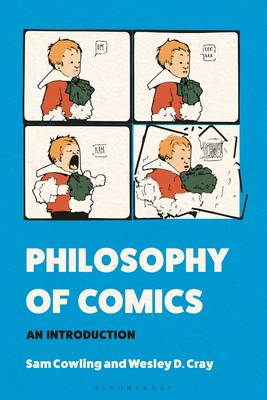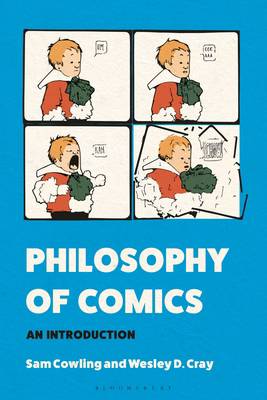
Bedankt voor het vertrouwen het afgelopen jaar! Om jou te bedanken bieden we GRATIS verzending (in België) aan op alles gedurende de hele maand januari.
- Afhalen na 1 uur in een winkel met voorraad
- In januari gratis thuislevering in België
- Ruim aanbod met 7 miljoen producten
Bedankt voor het vertrouwen het afgelopen jaar! Om jou te bedanken bieden we GRATIS verzending (in België) aan op alles gedurende de hele maand januari.
- Afhalen na 1 uur in een winkel met voorraad
- In januari gratis thuislevering in België
- Ruim aanbod met 7 miljoen producten
Zoeken
€ 152,95
+ 305 punten
Uitvoering
Omschrijving
What exactly are comics? Can they be art, literature, or even pornography? How should we understand the characters, stories, and genres that shape them?
Thinking about comics raises a bewildering range of questions about representation, narrative, and value. Philosophy of Comicsis an introduction to these philosophical questions. In exploring the history and variety of the comics medium, Sam Cowling and Wesley D. Cray chart a path through the emerging field of the philosophy of comics.
Drawing from a diverse range of forms and genres and informed by case studies of classic comics such as Watchmen, Tales from the Crypt, and Fun Home, Cowling and Cray explore ethical, aesthetic, and ontological puzzles, including:
- What does it take to create-or destroy-a fictional character like Superman?
- Can all comics be adapted into films, or are some comics impossible to adapt?
- Is there really a genre of "superhero comics"?
- When are comics obscene, pornographic, and why does it matter?
At a time of rapidly growing interest in graphic storytelling, this is an ideal introduction to the philosophy of comics and some of its most central and puzzling questions.
Thinking about comics raises a bewildering range of questions about representation, narrative, and value. Philosophy of Comicsis an introduction to these philosophical questions. In exploring the history and variety of the comics medium, Sam Cowling and Wesley D. Cray chart a path through the emerging field of the philosophy of comics.
Drawing from a diverse range of forms and genres and informed by case studies of classic comics such as Watchmen, Tales from the Crypt, and Fun Home, Cowling and Cray explore ethical, aesthetic, and ontological puzzles, including:
- What does it take to create-or destroy-a fictional character like Superman?
- Can all comics be adapted into films, or are some comics impossible to adapt?
- Is there really a genre of "superhero comics"?
- When are comics obscene, pornographic, and why does it matter?
At a time of rapidly growing interest in graphic storytelling, this is an ideal introduction to the philosophy of comics and some of its most central and puzzling questions.
Specificaties
Betrokkenen
- Auteur(s):
- Uitgeverij:
Inhoud
- Aantal bladzijden:
- 376
- Taal:
- Engels
Eigenschappen
- Productcode (EAN):
- 9781350098442
- Verschijningsdatum:
- 16/06/2022
- Uitvoering:
- Hardcover
- Formaat:
- Genaaid
- Afmetingen:
- 156 mm x 234 mm
- Gewicht:
- 693 g

Alleen bij Standaard Boekhandel
+ 305 punten op je klantenkaart van Standaard Boekhandel
Beoordelingen
We publiceren alleen reviews die voldoen aan de voorwaarden voor reviews. Bekijk onze voorwaarden voor reviews.









